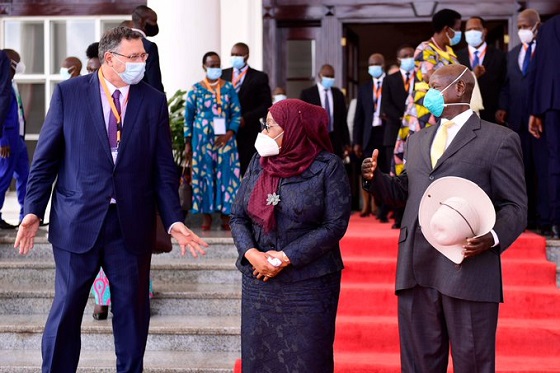A new publication, the fourth Finance Risk Update on the East African Crude Oil Pipeline, by BankTrack, Insure our Future, Inclusive Development International (IDI) and others, highlights the growing opposition to the EACOP project in Uganda, Tanzania and globally. In Uganda, resistance to the project appears to have persisted despite the country’s shrinking civil space and continued threats to human rights.

The Ugandan cabinet approved the EACOP construction license on January 17, 2023, followed by the Tanzanian government on February 21. However, despite these approvals, financing for the project still needs to be secured, and the expected financial close date has been postponed several times since the final investment decision was announced in February 2022.
The update also argues that the project’s climate impacts could be greater than previous estimates suggest. The Climate Accountability Institute (CAI) published a study in November 2022, revealing the project’s potential lifetime climate emissions to be 379 million tonnes of CO2 equivalent (MtCO2e), including the whole value chain of emissions from pipeline transport of crude oil to the oil’s end use by global consumers. However, the update shows how the EACOP could also be used for other oil fields in Uganda, the DRC, Tanzania, or even South Sudan, extending its lifespan and increasing the emissions it will enable.
The European Parliament passed an emergency resolution in September 2022 that recognises the disastrous impacts of the project on human rights and the climate and calls for an end to the extractive activities in protected and sensitive ecosystems, including the shores of Lake Albert. TotalEnergies, the project’s largest shareholder, has not indicated that it will comply with this resolution.
Because of the ever-increasing reputational, legal and financial risks and global public pressure, even more banks and insurers have ruled out support for it, bringing the total number of banks to 24 and insurers to 23. Among them are Italy’s largest bank, Intesa Sanpaolo, Germany’s second-largest bank, DZ Bank, and Natixis from France.
As the risks and opposition to the EACOP project continue to grow, the update urges financial institutions to consider the full range of environmental, human rights, and climate risks and impacts associated with the project and the commercial and reputational risks it poses to prospective investors, financiers, and insurers.
It also calls on them to engage robustly with TotalEnergies & CNOOC, the project sponsors, to push for an end to the project and to engage with the governments of Uganda and Tanzania to support a clean, renewable and rights-compatible energy future in line with Just Transition principles while scaling up their financial support for such a future.
The publication comes as the World Bank Group, which includes the International Finance Corporation (IFC), holds its Spring Meetings in Washington DC, this week. The risk update adds to the evidence that the project is not compliant with the IFC Performance Standards, which form the basis of the Equator Principles, to which many financial institutions are signatories.
Henrieke Butijn, climate campaigner & researcher, BankTrack, said: “After the fourth risk update, it is unbelievable that there are still banks, like Standard Chartered, that consider the risks of the EACOP project manageable and refuse to rule out support. The new risk update shows that financial, reputational and legal risks are piling up, not only for the financial advisors or banks and insurers considering support but also for financial institutions that provide services to TotalEnergies or CNOOC. Community members and CSOs in Uganda and Tanzania are clear: they do not want this project. Financial institutions should follow their lead.”
Coleen Scott, legal & policy associate, Inclusive Development International: “In their attempts to greenlight the project, supporters of the East African Crude Oil Pipeline (EACOP) have claimed, disingenuously, that it meets IFC Performance Standards, when that is clearly not the case. The fact that an IFC client chose to withdraw from the EACOP last year after conducting an IFC-endorsed risk assessment, tells us everything we need to know about the project’s compliance with the standards. Any Equator Bank genuinely interested in fulfilling their environmental and social commitments should heed the messages in this risk briefing and immediately withdraw their support.”
Zaki Mamdoo, StopEACOP Campaign Coordinator: “The severe financial and reputational risks for any investors and financial institutions who opt to support EACOP are increasingly difficult to ignore, especially in light of growing worldwide solidarity and support for the StopEACOP campaign.
“The world is rallying behind the project-affected persons and frontline activists who remain steadfast in their rejection of the project and the human rights violations linked to it. We are hopeful that more financial institutions will emulate those that have committed not to provide financial backing to EACOP and stand with us on the right side of history.”
